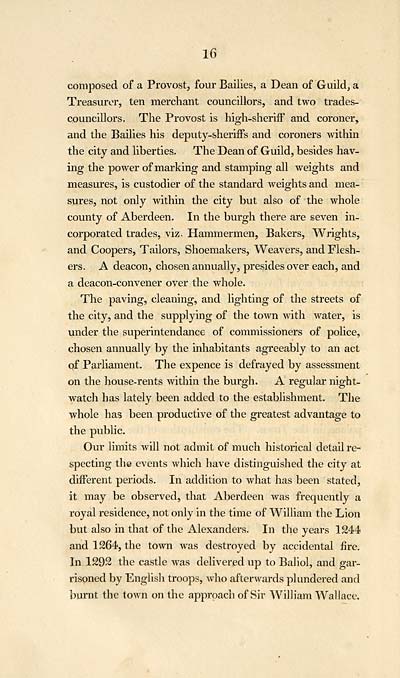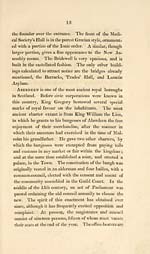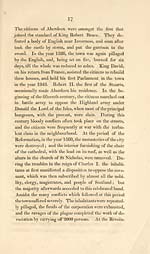Download files
Complete book:
Individual page:
Thumbnail gallery: Grid view | List view

16
composed of a Provost, four Bailies, a Dean of Guild, a
Treasurer, ten merchant councillors, and two trades-
councillors. The Provost is high-sheriff and coroner,
and the Bailies his deputy-sheriffs and coroners within
the city and liberties. The Dean of Guild, besides hav-
ing the power of marking and stamping all weights and
measures, is custodier of the standard weights and mea-
sures, not only within the city but also of the whole
county of Aberdeen. In the burgh there are seven in-
corporated trades, viz. Hammermen, Bakers, Wrights,
and Coopers, Tailors, Shoemakers, Weavers, and Flesh-
ers. A deacon, chosen annually, presides over each, and
a deacon-convener over the whole.
The paving, cleaning, and lighting of the streets of
the city, and the supplying of the town with water, is
under the superintendance of commissioners of police,
chosen annually by the inhabitants agreeably to an act
of Parliament. The expence is defrayed by assessment
on the house-rents within the burgh. A regular night-
watch has lately been added to the establishment. The
whole has been productive of the greatest advantage to
the public.
Our limits will not admit of much historical detail re-
specting the events which have distinguished the city at
different periods. In addition to what has been stated,
it may be observed, that Aberdeen was frequently a
royal residence, not only in the time of William the Lion
but also in that of the Alexanders. In the years 1244
and 1264, the town was destroyed by accidental fire.
In 1292 the castle was delivered up to Baliol, and gar-
risoned by English troops, who afterwards plundered and
burnt the town on. the approach of Sir William Wallace.
composed of a Provost, four Bailies, a Dean of Guild, a
Treasurer, ten merchant councillors, and two trades-
councillors. The Provost is high-sheriff and coroner,
and the Bailies his deputy-sheriffs and coroners within
the city and liberties. The Dean of Guild, besides hav-
ing the power of marking and stamping all weights and
measures, is custodier of the standard weights and mea-
sures, not only within the city but also of the whole
county of Aberdeen. In the burgh there are seven in-
corporated trades, viz. Hammermen, Bakers, Wrights,
and Coopers, Tailors, Shoemakers, Weavers, and Flesh-
ers. A deacon, chosen annually, presides over each, and
a deacon-convener over the whole.
The paving, cleaning, and lighting of the streets of
the city, and the supplying of the town with water, is
under the superintendance of commissioners of police,
chosen annually by the inhabitants agreeably to an act
of Parliament. The expence is defrayed by assessment
on the house-rents within the burgh. A regular night-
watch has lately been added to the establishment. The
whole has been productive of the greatest advantage to
the public.
Our limits will not admit of much historical detail re-
specting the events which have distinguished the city at
different periods. In addition to what has been stated,
it may be observed, that Aberdeen was frequently a
royal residence, not only in the time of William the Lion
but also in that of the Alexanders. In the years 1244
and 1264, the town was destroyed by accidental fire.
In 1292 the castle was delivered up to Baliol, and gar-
risoned by English troops, who afterwards plundered and
burnt the town on. the approach of Sir William Wallace.
Set display mode to: Large image | Transcription
Images and transcriptions on this page, including medium image downloads, may be used under the Creative Commons Attribution 4.0 International Licence unless otherwise stated. ![]()
| Gazetteers of Scotland, 1803-1901 > Descriptive account of the principal towns in Scotland > (36) Page 16 |
|---|
| Permanent URL | https://digital.nls.uk/97351137 |
|---|

